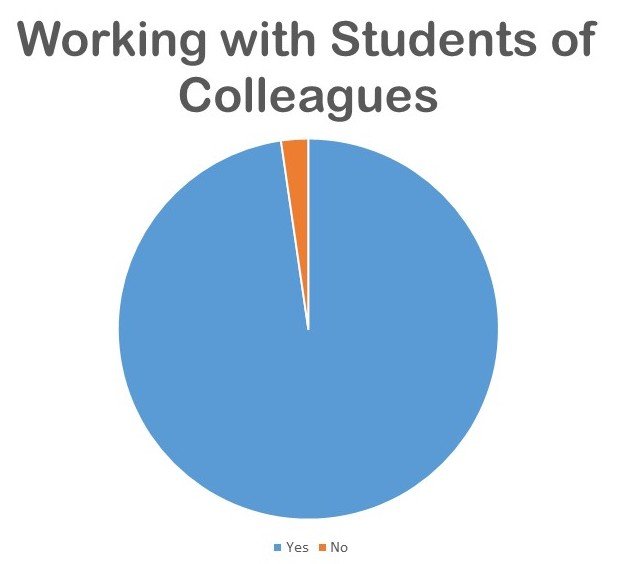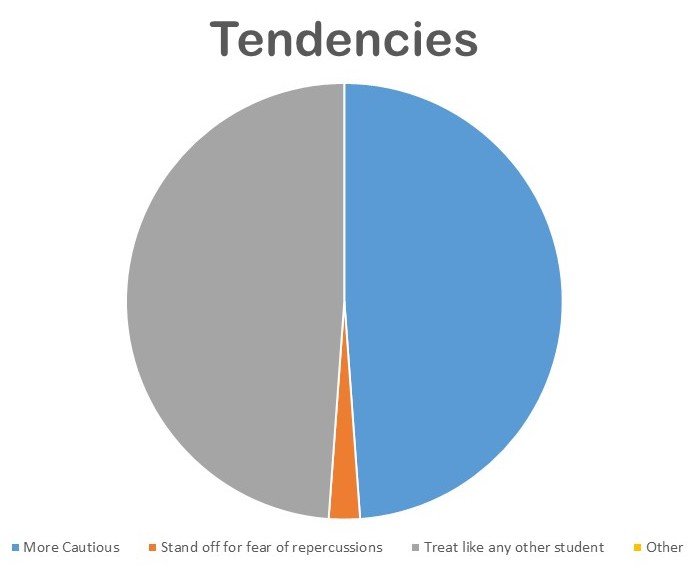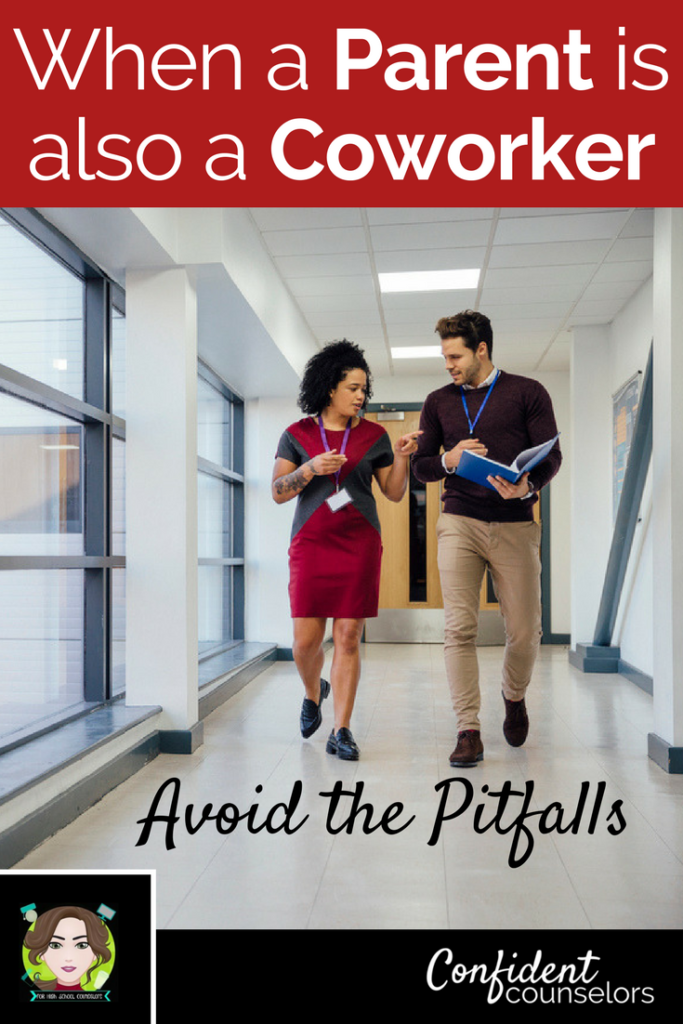One of the challenges that we rarely talk about in our profession is when a parent is also a coworker. Often these relationships are positive or benign, but there are those times when working with the child of a colleague can be frustrating or downright uncomfortable. Case in point, here is an example of a scenario with a coworker who worked in another school in my district.
My Learning Experience
I had arranged a senior meeting with this coworker about her son. At the beginning of this senior meeting, she tells me that she wants to discuss her tenth grader’s schedule for next year. When we successfully finished the conversation about her son, I turned my attention to her daughter and she completely snapped.
How dare you mention your concerns in front of my daughter. I want to see your principal and request another counselor!
Now, I have never experienced anyone snapping at me like this before. I have had disgruntled parents, principal complaints, and misunderstandings, but no one has ever asked for another counselor after what seemed to be a pleasant conversation.
At this point, I do not know what happened inside of me, but I immediately got up and told the parent to follow me to the principal’s office. In the principal’s office, the parent completely went off about me. When she was done, I made a passionate plea why it was not in the student’s best interest to change their counselor at this point.
What came out next shocked me. I looked at the parent and principal and said,
I feel that it is wrong to move these students based on a simple disagreement between two colleagues.
Okay, this was a huge risk as my principal often sided with parents on complaints. However, the principal looked at us and then said,
You are right, we should not make a hasty decision and I believe your children’s counselor has their best interest in mind.
The parent walked out of the office and it would be another year before she would ever come back to meet with me.
The purpose of writing on this subject is to uncover the complexities of working with coworkers and their children. Overall, my experiences with colleagues and their kids have been positive; however, we know that it only takes one conversation turned explosion to ruin this relationship.
When I decided to write this post, I wanted to share my tips for this unique relationship, but I also I wanted to hear from other school counselors about their experiences. So, I sent out a survey and asked several questions:
Questions
- What grade level do you work with?
- Do or have you worked with students of your colleagues?
- When working with a coworker’s child, how do you treat them?
- Describe one negative experience with a colleague and how you responded (either negatively or positively).
- Name one tactic school counselors can employ when this relationship is tense or has become negative.
Here is the breakdown of the responses from other school counselors:
Survey Results
Most respondents were at the high school level.
Almost all had worked with a parent is also a coworker.
Respondents split evenly between a tendency to either be more cautious in their treatment of coworker’s children or to treating everyone equally.



After providing this general information, I wanted to know about the experiences school counselors have encountered with their parent-coworker. Here are some experiences they shared.
Negative Behaviors
Blame Game
A colleague blamed the school counselor for her child’s denial into a summer program after the counselor reported a disciplinary infraction.
Challenging the School Counselor’s Expertise
The parent of one of the students on the counselor’s caseload believed that her son’s potential was enough for college acceptance. The school counselor explained that colleges look at test scores and academic performance and not potential. Parent was not convinced that the counselor was telling her the truth and questioned her expertise.
Demanding Behaviors
A school counseling colleague in another high school “voluntold” the counselor to nominate her child for several scholarships and programs. The school counselor started to avoid her colleague because of the demands.
Favoritism
A coworker wanted his/her child to have a certain teacher, but the school counselor could not make changes without being reprimanded by the principal. The counselor refused to change the schedule.
Intimidation Tactics
An angry coworker wanted the school counselor to write a letter of recommendation immediately for his/her child and give the student a college fee waiver for which the student did not qualify.
Involving School Administration and Other Colleagues
A teacher approached the school counselor about changing his/her child’s schedule. The school counselor worked on the schedule for several days and finally was able to change the student’s schedule. However, the parent came to see the counselor two additional times to have his/her son’s schedule changed again. The second time the coworker asked for a schedule change, the counselor did not change the schedule. Unfortunately, that did not stop the parent and he/she had another teacher reach out to the school counselor about changing the student’s schedule.
Trash Talking
This school counselor works in a small district that offers dual enrollment courses, but not Advanced Placement classes. A high level, outspoken colleague made a comment that his/her student was not afforded the opportunity to take AP courses. The school counselor met with the parent and explained that his/her student was taking dual enrollment classes which are weighted the same as AP classes. Once the parent understood, the negative comments finally ceased.
Unethical Behavior
One school counselor experienced unethical behavior from a colleague when the parent expected that his/her child should be eligible for waivers that the student did not qualify.
Following school counselors’ descriptions of strained relationships, I asked if they were willing to share helpful advice for when a relationship with a parent who is also a coworker gets negative.
When the Parent-Coworker Relationship Turns Negative
- Use transparency in presenting information and make it clear what is expected of students and parents.
- Always refer to ASCA and your state’s standards and procedures no matter what student or parent you are working with.
- Remind your colleague of your role as a school counselor.
- Advocate for your student and try to understand the parent’s perspective.
- Involve the student as much as possible in decisions.
- Do not allow a colleague to complain about other colleagues.
- Show professionalism with all parents and colleagues.
- Remember to set boundaries with parents early.
- Keep communication in writing, especially with a tense relationship. Documentation is important!
- Remind coworkers of your ethical and legal responsibilities to students.
- Do not allow coworkers to use their position to get favors for their children.
- Get to know your colleagues and form relationships with them.
I appreciate the great feedback from our school counseling colleagues and I wanted to add one additional tip that I feel could be helpful if this unique relationship becomes strained. Thankfully, I have learned many new skills since I worked with that parent.
Since electronic communication is the mode that many parents use to communicate, it is important that we do not allow our own emotions to seep into our electronic correspondences. Parents, even those that are coworkers, will CC or forward our emails to administrators.
Here is a format you can use when communicating with parent/colleagues electronically, especially if their communication is blaming or demeaning. This approach is called the BIFF method created by social worker and attorney, Bill Eddy.
Low Conflict Communication: BIFF
After receiving a less than pleasant email from a colleague, refrain from replying instantly. Wait and formulate an email using these four simple steps:
1. Brief: Do not respond to criticism and keep your responses short to reduce continued angry emails.
2. Informative: Respond to an email in order to correct inaccurate information. Stick to the facts that set the record straight.
3. Friendly: Recognize the person’s concern in a friendly manner. You do not have to be over friendly, but avoid being antagonistic.
4. Firm: Be confident in your response. Tell the person your position or information. If you must respond again, make responses shorter and state the same information.
If you receive a nasty email in response using the format above, do not respond. You have stated what you needed to and it is not helpful to spend your time going back around the same mountain so to speak.
Have you worked with a parent is also a coworker?
Has this relationship ever gotten tense? Share your tips in the comments below!
Other Tips for Working with Parents from Confident Counselors and For High School Counselor archive.
7 Simple Ways to Calm an Angry Parent and Improve Communication
A Tutorial on Responding to High Conflict Parents





